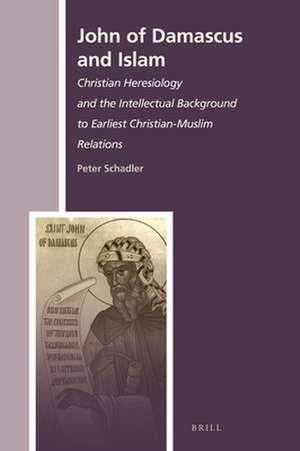John of Damascus and Islam: Christian Heresiology and the Intellectual Background to Earliest Christian-Muslim Relations: The History of Christian-Muslim Relations, cartea 34
Autor Peter Schadleren Limba Engleză Hardback – 6 dec 2017
Din seria The History of Christian-Muslim Relations
- 18%
 Preț: 678.12 lei
Preț: 678.12 lei - 18%
 Preț: 892.97 lei
Preț: 892.97 lei - 18%
 Preț: 691.72 lei
Preț: 691.72 lei - 18%
 Preț: 695.88 lei
Preț: 695.88 lei - 18%
 Preț: 832.48 lei
Preț: 832.48 lei - 18%
 Preț: 1000.69 lei
Preț: 1000.69 lei - 18%
 Preț: 793.88 lei
Preț: 793.88 lei - 18%
 Preț: 685.99 lei
Preț: 685.99 lei - 18%
 Preț: 585.19 lei
Preț: 585.19 lei - 18%
 Preț: 592.38 lei
Preț: 592.38 lei - 18%
 Preț: 571.13 lei
Preț: 571.13 lei - 18%
 Preț: 640.09 lei
Preț: 640.09 lei - 18%
 Preț: 928.44 lei
Preț: 928.44 lei - 18%
 Preț: 640.09 lei
Preț: 640.09 lei - 18%
 Preț: 531.33 lei
Preț: 531.33 lei - 18%
 Preț: 527.42 lei
Preț: 527.42 lei - 18%
 Preț: 926.88 lei
Preț: 926.88 lei - 18%
 Preț: 1058.31 lei
Preț: 1058.31 lei - 18%
 Preț: 972.46 lei
Preț: 972.46 lei - 18%
 Preț: 863.90 lei
Preț: 863.90 lei - 18%
 Preț: 1234.22 lei
Preț: 1234.22 lei
Preț: 606.83 lei
Preț vechi: 740.03 lei
-18% Nou
Puncte Express: 910
Preț estimativ în valută:
116.13€ • 126.10$ • 97.55£
116.13€ • 126.10$ • 97.55£
Carte indisponibilă temporar
Doresc să fiu notificat când acest titlu va fi disponibil:
Se trimite...
Preluare comenzi: 021 569.72.76
Specificații
ISBN-13: 9789004349650
ISBN-10: 9004349650
Pagini: 264
Dimensiuni: 155 x 235 x 23 mm
Greutate: 0.54 kg
Editura: Brill
Colecția Brill
Seria The History of Christian-Muslim Relations
ISBN-10: 9004349650
Pagini: 264
Dimensiuni: 155 x 235 x 23 mm
Greutate: 0.54 kg
Editura: Brill
Colecția Brill
Seria The History of Christian-Muslim Relations
Cuprins
Acknowledgments
Abbreviations
Introduction
1 Heresy and Heresiology in Late Antiquity
Problems in Associating Islam with Heresy
Manichaeism: The Exception that Proves the Rule
Heresy as Opposition to the Church
Other Understandings of Heresy in Late Antiquity
Early Christian Use of Heresiology
The Demonic Nature of Heresy
Heresy as the Result of Philosophical Speculation
Other Typical Traits of Heresiology
2 Aspects of the Intellectual Background
The Encyclopedism of Christian Palestine
Heresiology as History?
The Sociological Imperative to Institution Building as a Force for Islam’s Inclusion
From Heresiology to Panarion and from Panarion to Anacephalaeosis: The Shifting Nature of Heresiology
John of Damascus and non-Christian Philosophy
The Definition of Heresy in John’s Works
Demons and the Heresiology of John
3 The Life of John of Damascus, His Use of the Qurʾan, and the Quality of His Knowledge of Islam
The Life of John of Damascus
John of Damascus and Arabic
The Qurʾan and its Apparent Use Among Christians
John of Damascus and the Qurʾan
Anastasius of Sinai and the Qurʾan
The Alleged Leo-Umar Correspondence
Lives of the Prophets and Other Sources
4 Islamic and Para-Islamic Traditions
Scholarly Accounts of Early Islam
Revisionist Islamic Studies and its Antecedents
Contemporary Islamic Studies
John of Damascus, the Black Stone, and the Ka’ba
The Ka’ba, the Black Stone, and the Maqām Ibrāhīm in the Islamic Tradition
An Untraditional Perspective
The Damascene’s Observations Given the Untraditional Perspective
Rivers in Paradise
The Monk and an-Nasara
Female Circumcision
Pillars of Faith
5 John of Damascus and Theodore Abu Qurrah on Islam
Problems Authenticating Abu Qurrah’s Greek Corpus
Theodore Abu Qurrah on Islam
Theodore, the Qurʾan, and Muhammad
The Arian Monk
Theodore and Heresy
Theodore and John: Some Differences and Conclusions
Conclusion
Appendix 1: Greek Text and English Translation of ‘On Heresies 100’
Appendix 2: Potential Qurʾanic References in ‘On Heresies 100’
Bibliography
Index
Abbreviations
Introduction
1 Heresy and Heresiology in Late Antiquity
Problems in Associating Islam with Heresy
Manichaeism: The Exception that Proves the Rule
Heresy as Opposition to the Church
Other Understandings of Heresy in Late Antiquity
Early Christian Use of Heresiology
The Demonic Nature of Heresy
Heresy as the Result of Philosophical Speculation
Other Typical Traits of Heresiology
2 Aspects of the Intellectual Background
The Encyclopedism of Christian Palestine
Heresiology as History?
The Sociological Imperative to Institution Building as a Force for Islam’s Inclusion
From Heresiology to Panarion and from Panarion to Anacephalaeosis: The Shifting Nature of Heresiology
John of Damascus and non-Christian Philosophy
The Definition of Heresy in John’s Works
Demons and the Heresiology of John
3 The Life of John of Damascus, His Use of the Qurʾan, and the Quality of His Knowledge of Islam
The Life of John of Damascus
John of Damascus and Arabic
The Qurʾan and its Apparent Use Among Christians
John of Damascus and the Qurʾan
Anastasius of Sinai and the Qurʾan
The Alleged Leo-Umar Correspondence
Lives of the Prophets and Other Sources
4 Islamic and Para-Islamic Traditions
Scholarly Accounts of Early Islam
Revisionist Islamic Studies and its Antecedents
Contemporary Islamic Studies
John of Damascus, the Black Stone, and the Ka’ba
The Ka’ba, the Black Stone, and the Maqām Ibrāhīm in the Islamic Tradition
An Untraditional Perspective
The Damascene’s Observations Given the Untraditional Perspective
Rivers in Paradise
The Monk and an-Nasara
Female Circumcision
Pillars of Faith
5 John of Damascus and Theodore Abu Qurrah on Islam
Problems Authenticating Abu Qurrah’s Greek Corpus
Theodore Abu Qurrah on Islam
Theodore, the Qurʾan, and Muhammad
The Arian Monk
Theodore and Heresy
Theodore and John: Some Differences and Conclusions
Conclusion
Appendix 1: Greek Text and English Translation of ‘On Heresies 100’
Appendix 2: Potential Qurʾanic References in ‘On Heresies 100’
Bibliography
Index
Notă biografică
Peter F. Schadler, D.Phil (2011), University of Oxford, is an Assistant Professor of Religion at Dickinson College. He has published articles on Jewish, Christian, and Muslim Relations, early Christian Hagiographical Methodology, and early Christian conceptions of Conciliar Authority in the Eastern Roman Empire and Near East.
